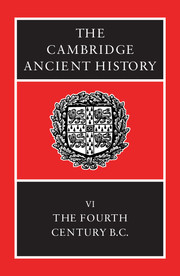Book contents
- Frontmatter
- 1 Sources and their uses
- 2 Sparta as victor
- 3 Persia
- 4 The Corinthian War
- 5 Sicily, 413–368 B.C.
- 6 The King's Peace and the Second Athenian Confederacy
- 7 Thebes in the 360s B.C.
- 8 Regional surveys I: Persian lands and neighbours
- 9 Regional surveys II: the West and North
- 10 Society and economy
- 11 The polis and the alternatives
- 12 Greek culture and science
- 13 Dion and Timoleon
- 14 Macedon and north-west Greece
- 15 Macedonian hegemony created
- 16 Alexander the Great Part 1: The events of the reign
- 17 Alexander the Great Part 2: Greece and the conquered territories
- 18 Epilogue
- Chronological Table
- BIBLIOGRAPHY
- Index
- Map 1: Greece and Western Asia Minor
- Map 9: Egypt
- Map 20: Alexanders campaigns
- References
15 - Macedonian hegemony created
Published online by Cambridge University Press: 28 March 2008
- Frontmatter
- 1 Sources and their uses
- 2 Sparta as victor
- 3 Persia
- 4 The Corinthian War
- 5 Sicily, 413–368 B.C.
- 6 The King's Peace and the Second Athenian Confederacy
- 7 Thebes in the 360s B.C.
- 8 Regional surveys I: Persian lands and neighbours
- 9 Regional surveys II: the West and North
- 10 Society and economy
- 11 The polis and the alternatives
- 12 Greek culture and science
- 13 Dion and Timoleon
- 14 Macedon and north-west Greece
- 15 Macedonian hegemony created
- 16 Alexander the Great Part 1: The events of the reign
- 17 Alexander the Great Part 2: Greece and the conquered territories
- 18 Epilogue
- Chronological Table
- BIBLIOGRAPHY
- Index
- Map 1: Greece and Western Asia Minor
- Map 9: Egypt
- Map 20: Alexanders campaigns
- References
Summary
AFTERMATH OF THE PEACE OF PHILOCRATES
Most Athenians had not been privy to the detail of what had happened. Their conviction of Macedonian perfidy had been mitigated somewhat during the two or three months of the middle of 346, but was now redoubled by the settlement of the Third Sacred War. The foreshadowed benefits were not, could not be, delivered: Oropus remained in Theban hands, Euboea under Theban influence, Thespiae and Plataea depopulated. What the Athenians did not see was that their expectations were beyond reach, since Philip must not drive Thebes, already disaffected, into open opposition while Athens’ adherence remained any less than certain. Those like Demosthenes declined to point this out, and their credibility, in the circumstances, stood high. Philip, for his part, if he was serious about a settlement based on Athens, must devote himself more than ever to courting the disenchanted inamorata. Generous diplomacy would have to accomplish, if anything could, what artifice had not. It is not that Philip was without supporters in Athens. Nine of the ten envoys of 346, all but Demosthenes, continued to support the new peace as the vehicle of potential Macedonian benefaction, refusing to repudiate it or its architect. In the current climate that may have seemed foolish, certainly suspect. They believed, so we must infer, what he had told them about his interests and intentions and judged, presumably, that they would eventually be vindicated. Aeschines, who had successfully countercharged Timarchus with immorality, thus temporarily invalidating the charge of parapresbeia against him, was prominent among them. Their opponents, foremost among them Demosthenes, while realizing that for safety's sake the peace must be upheld since the alliance was now a dead letter, were nevertheless determined that any further Philippic overtures must be rejected.
- Type
- Chapter
- Information
- The Cambridge Ancient History , pp. 760 - 790Publisher: Cambridge University PressPrint publication year: 1994

